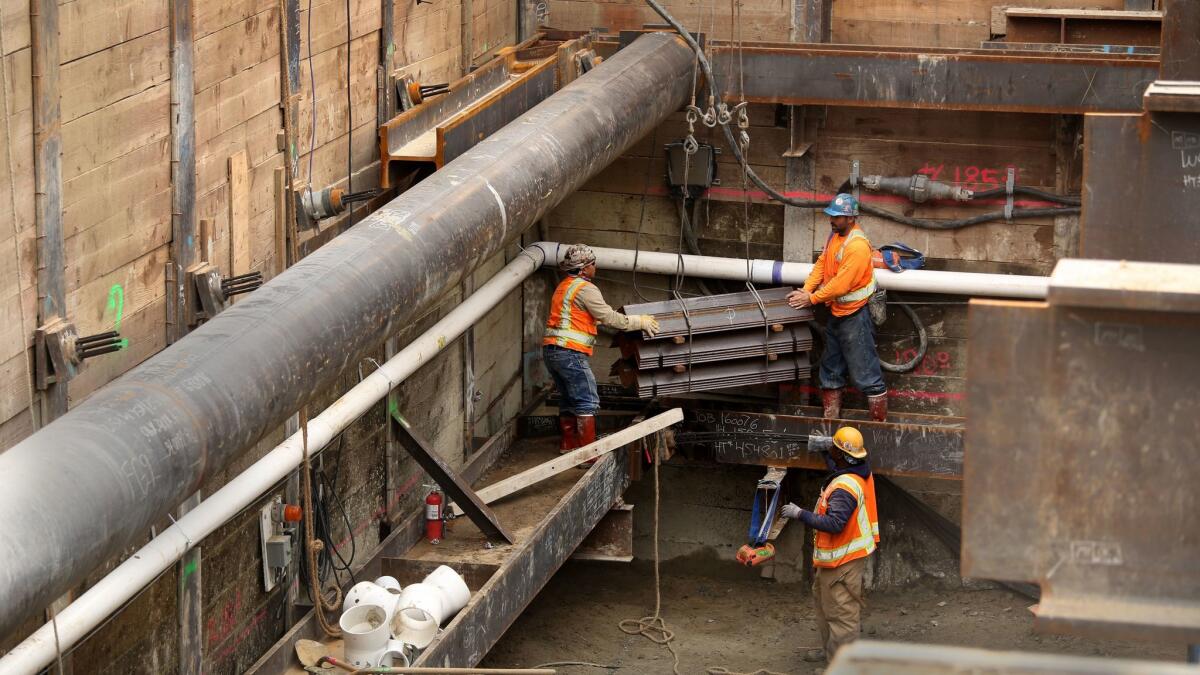Metro picks controversial contractor to build the next phase of the Westside’s Purple Line

- Share via
Local transportation officials on Thursday hired one of the more controversial names in California construction to build a $2.4-billion section of the Westside subway, which will connect Century City to downtown Los Angeles.
The Metropolitan Transportation Authority’s board of directors voted 8-0 to award a $1.37-billion contract to a joint venture led by Sylmar-based Tutor Perini Corp. and Chief Executive Ronald Tutor.
The board’s vote marks a form of redemption for Tutor, whose work on L.A.’s first subway a generation ago sparked a protracted legal battle that, until now, had left him excluded from Metro’s rail building boom.
Tutor’s bid was hundreds of millions of dollars lower than his competitors, drawing criticism from some skeptics. But during Thursday’s meeting, Tutor told directors that he had “cross-checked until my eyes crossed” to ensure the bid was accurate.
The decision to select the lowest bidder could pose challenges for Metro, which will face the risk of cost overruns and so-called change orders that could add to the price of the complicated subway project.
“There is an old saying I subscribe to: Once bitten, twice shy,” said former Los Angeles County Supervisor Zev Yaroslavsky, who served on the Metro board for two decades. “Metro has a long history with the Tutor company, and it’s a not a good one.”
Tutor could not be reached for comment.
In a prepared statement, Metro officials promised “a strong oversight plan with experienced staff” to keep the project on time and on budget. That could include periodic meetings between Tutor and Metro Chief Executive Phil Washington “to resolve project claims and changes,” the release said.
The Purple Line, which will eventually connect downtown to West L.A. by a half-hour subway ride, is the most anticipated rail project in a generation.
Its second phase will extend west from Wilshire Boulevard and La Cienega Avenue, running beneath Beverly Hills High School and into Century City. The 2.59-mile extension is scheduled to open in 2025.
Tutor Perini and its partner, Connecticut-based O&G Industries, have been hired for a highly technical job: Digging and aligning their tunnels with the first phase of the subway project, which is currently under construction between Koreatown and the intersection of Wilshire and La Cienega boulevards.
In 1995, Tutor-Saliba-Perini sued Metro, claiming $16 million in alleged unpaid expenses for work on three subway stations along Wilshire Boulevard. Metro filed a cross-complaint several years later, alleging that Tutor had demanded money for illegitimate claims.
After a decade of legal skirmishes, a judge ruled in 2001 that the firm and its attorneys had destroyed and withheld documents, turned in false claims for payment and used minority subcontractor companies as fronts. A jury awarded Metro about $29 million, plus legal fees and other expenses.
For the current Purple Line project, Tutor’s total bid was $1.45 billion, which includes more factors than the contract award, such as compensation for potential delays. The proposal was $493 million lower than the second-place bid and $871 million lower than the third, a difference of nearly 60%.
“I don’t think I’ve ever seen three bidders on a project that were so far apart from one another,” Yaroslavsky said. “Because of the history that Metro has had with the Tutor company, you have to wonder how rigorously the financial aspects of the bid were analyzed.”
The Tutor group received the lowest score for its proposals to build and manage the project. In a statement, Metro officials said all three proposals “were comparable on their technical merits,” but the Tutor Perini team’s proposal was the “best value.”
When Metro director Jacqueline Dupont-Walker questioned Tutor on Thursday about the cost difference, he acknowledged that it “must have come to people’s attention,” but stood by the estimate, saying no company had more experience building L.A. subways.
“We’ve built most of this system,” Tutor said. “We know what it costs us.”
He added that the firm’s earlier legal battles were not about the quality of the work. During subway construction, there were some questions about the thickness of the tunnel walls near downtown, but Metro staff said at the time that the walls were structurally sound.
Tutor’s work on the subway tunnel through the Cahuenga Pass to North Hollywood was completed ahead of schedule.
The suite of Tutor companies has worked on other major L.A. projects over the years, including the Alameda Corridor, a rail expressway that serves the ports of Los Angeles and Long Beach. It opened in 2002 on budget and on schedule.
The Sylmar firm also is the contractor on the first section of the California high-speed rail project. The company has requested compensation for more than a year of delays on construction caused by problems with land acquisition in the Central Valley.
Four Metro directors were absent for the Westside subway decision, including Los Angeles Mayor Eric Garcetti, who cited a conflict and said he couldn’t vote. Director Kathryn Barger, a Los Angeles County supervisor, did not vote, citing a conflict.
For more transportation news, follow @laura_nelson on Twitter.
ALSO
2 hikers injured in avalanche near Mt. Baldy
Video shows California prisoners offering protection and escape help to drug lord ‘El Chapo’
Missing Porsche belonging to slain renowned professional hairdresser is recovered
UPDATES:
10:14 a.m. This article was updated to correct the end point of the first phase of the Purple Line, and to note that Mayor Eric Garcetti was absent for the vote because of a conflict.
More to Read
Sign up for Essential California
The most important California stories and recommendations in your inbox every morning.
You may occasionally receive promotional content from the Los Angeles Times.











